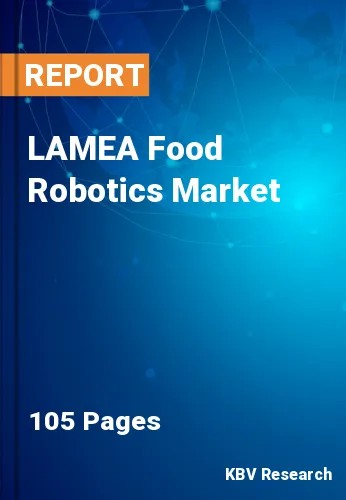The Latin America, Middle East and Africa Food Robotics Market would witness market growth of 12.7% CAGR during the forecast period (2022-2028).
Robotic capabilities and applications have typically been restricted to manufacturing big payloads for transportation equipment. However, many industries, including the food processing sector, are adopting automation using mostly light payload robots due to the expanding capability of robots. To adhere to health authority regulations, sectors of the food and beverage industry, including dairy and baking, minimize human interaction throughout the production process.
The expansion of robot capability to encompass packaging, bundling, and palletizing presents a chance for the food robotics market to expand. There are several advantages to robots. They include fewer jobs requiring strenuous manual labor, fewer workplace accidents, the ability to complete tasks that humans find extremely unpleasant, an improvement in the quality of the finished product, the capability to perform tasks that humans find extremely challenging to complete manually, an increase in productivity, an increase in flexibility, an improvement in safety, an increase in order fulfillment speed and accuracy, an increase in uptime, and a decrease in cost. The food business would increasingly employ robot technology due to all these advantages.
Increased government regulations on food safety are driving the market for food robotics. In addition, demand for processed foods is rising due to a growing population of health-conscious consumers worldwide, boosting the need for automation and robots in the food business. Robots' adaptability and capacity for continuous work over long periods have expanded their range of tasks, including palletizing, processing, and packaging. Robots are primarily used in the meat and dairy processing industries to eliminate the human touch and uphold sanitation and hygiene.
The UAE's food and beverage business are robust, and its consumers are getting more selective. Some food and beverage firms have been compelled to make challenging decisions, but these decisions have proven to be vitally essential. Due to these factors, the demand for food and beverages from the hospitality industry in the LAMEA region is expanding. As a result of these factors, the regional need for new technology to be used in the food sector for food processing, delivery, and other operations is expanding. This would result in market growth during the projected time.
The Brazil market dominated the LAMEA Food Robotics Market by Country in 2021; thereby, achieving a market value of $65.6 million by 2028. The Argentina market is showcasing a CAGR of 13.3% during (2022 - 2028). Additionally, The UAE market would register a CAGR of 12.4% during (2022 - 2028).
Based on Application, the market is segmented into Palletizing & Processing, Packaging, Repackaging, Pick & Place, and Others. Based on Payload, the market is segmented into Medium, High, and Low. Based on Type, the market is segmented into Articulated, Cartesian, Scara, Cylindrical, Collaborative, and Others. Based on countries, the market is segmented into Brazil, Argentina, UAE, Saudi Arabia, South Africa, Nigeria, and Rest of LAMEA.
Free Valuable Insights: The Global Food Robotics Market is Predict to reach $4 Billion by 2028, at a CAGR of 10.2%
The market research report covers the analysis of key stake holders of the market. Key companies profiled in the report include Mitsubishi Electric Corporation, ABB Group, Rockwell Automation, Inc., Kawasaki Heavy Industries, Ltd., Kuka AG (Midea Investment Holding Co., Ltd.), FANUC Corporation, Yaskawa Electric Corporation, Seiko Epson Corporation, Teradyne, Inc. (Universal Robots A/S) and Denso Corporation
By Application
By Payload
By Type
By Country
Our team of dedicated experts can provide you with attractive expansion opportunities for your business.

